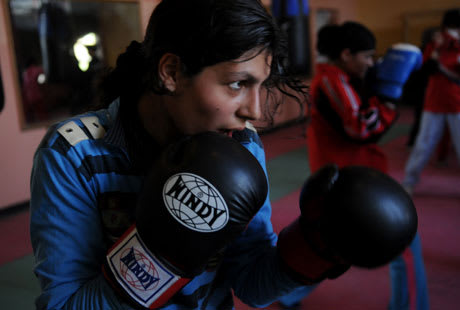Even if the template of boxing as a metaphor for a larger political or personal fight is rote, Ariel J. Nasr's The Boxing Girls of Kabul rides it out respectfully, detailing the efforts of three young Afghan women training to represent their country in the Olympics for boxing. It's a David and Goliath battle without the strained melodrama, taking a realist approach to how difficult fighting, both literally and figuratively, is when everyone and everything is against you.
Training in a stadium previously used for executing problematic Afghan women, these nascent pugilists have limited equipment and resources to help them, instead focusing on boxing with each other while their coach battles bureaucracy to obtain the necessary aid and equipment. After travelling to Vietnam to compete in a tournament round where they all lose, the girls battle the realities of being insufficiently trained as well as the political climate back home, where news stories of stonings impose a very real threat on them and their families.
What's smart about Nasr's well paced, if too brief and subtle, doc is the level of pragmatic intimacy it obtains in its interviews with the subjects, who acknowledge public harassment and fear being caught alone. They also have a very practical perception of themselves, noting that without having even a boxing ring to practice in, there's no way they can compete against the rigorously trained women of Kazakhstan, Vietnam and China.
As a viewer, the hope that these subjects will overcome their obstacle is there, but what challenges us is the reality of repeat failure even in the face of the courage and passion. As much as the standard Western narrative likes to dole out the idealistic notion that perseverance and justice always triumph, this isn't always the case.
(NFB)Training in a stadium previously used for executing problematic Afghan women, these nascent pugilists have limited equipment and resources to help them, instead focusing on boxing with each other while their coach battles bureaucracy to obtain the necessary aid and equipment. After travelling to Vietnam to compete in a tournament round where they all lose, the girls battle the realities of being insufficiently trained as well as the political climate back home, where news stories of stonings impose a very real threat on them and their families.
What's smart about Nasr's well paced, if too brief and subtle, doc is the level of pragmatic intimacy it obtains in its interviews with the subjects, who acknowledge public harassment and fear being caught alone. They also have a very practical perception of themselves, noting that without having even a boxing ring to practice in, there's no way they can compete against the rigorously trained women of Kazakhstan, Vietnam and China.
As a viewer, the hope that these subjects will overcome their obstacle is there, but what challenges us is the reality of repeat failure even in the face of the courage and passion. As much as the standard Western narrative likes to dole out the idealistic notion that perseverance and justice always triumph, this isn't always the case.
